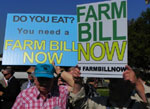Congress Leaves Town with Farm Bill Issues Unresolved
August 7, 2013
 Congress left Washington August 1st for a five-week recess, with the fate of the 2013 farm bill still very much up in the air. Prior to leaving town, House Republican leaders negotiated a farm bill nutrition title that raises to $40 billion the level of cuts to food stamp programs. This food stamp-only measure is likely to be voted on once the House returns Sept. 9.
Congress left Washington August 1st for a five-week recess, with the fate of the 2013 farm bill still very much up in the air. Prior to leaving town, House Republican leaders negotiated a farm bill nutrition title that raises to $40 billion the level of cuts to food stamp programs. This food stamp-only measure is likely to be voted on once the House returns Sept. 9.
The House has already passed a farm programs-only version of the farm bill, while the Senate’s farm bill contains both farm and nutrition programs. Prior to leaving on recess, the Senate named 12 conferees from the Agriculture Committee to meet with their counterparts in the House, once the House leadership names its set of conferees.
The August recess offers another chance for dairy farmers to tell lawmakers how important it is to pass a farm bill that includes the dairy policy reforms endorsed by the Senate in June. This message can be delivered in the coming weeks at August town hall and Congress-on-your-corner meetings, Labor Day parades, individual office meetings, and so forth.
Once Congress returns to Capitol Hill after Labor Day, the time frame in which to pass a compromise bill is limited. Many farm programs, including the MILC program, expire September 30th. Further complicating things, the current agriculture appropriations measure expires the same day.
The price support program is authorized through December 31st, after which permanent law likely would be activated, potentially resulting in much higher support levels for a variety of farm commodities, including milk.
3 Key Messages for Legislators in August
Here are three key reasons why Congress must enact the Senate dairy reform provisions over those in the House bill:
- The Senate provides an effective dairy safety net at low cost, while the House does not. The House bill encourages milk supplies to build up and prices to plummet. Without a market stabilization program, the House margin insurance plan will threaten the viability of dairy farming.
- The Senate dairy title is fiscally responsible, while the House version is not. The House bill creates a new, open-ended dairy subsidy. Taxpayer costs would have been $1 billion higher under the House bill, had it been in effect over the last four years.
- Contrary to misleading statements from dairy processors, the Senate dairy provisions will not hurt consumers. Had it been in effect between 2009 and 2012 the Senate bill would cost the average American family only 25 cents extra per year for dairy products.






